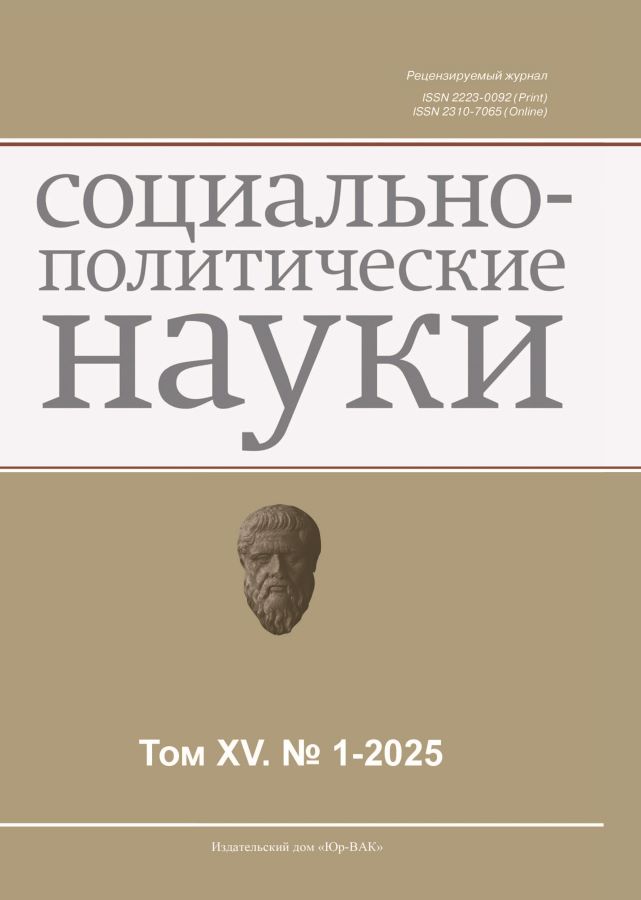Formation of civil society as a problem of Russian civilization: a combination of traditions and modern values
- Authors: Melnikov N.N.1
-
Affiliations:
- Saint-Petersburg State Forest Technical University
- Issue: Vol 15, No 1 (2025)
- Pages: 134-138
- Section: Social Structure Social Institutions and Processes
- URL: https://journals.eco-vector.com/2223-0092/article/view/679177
- DOI: https://doi.org/10.33693/2223-0092-2025-15-1-134-138
- EDN: https://elibrary.ru/ILZAYA
- ID: 679177
Cite item
Abstract
The aim of the research is a comprehensive analysis of the problems of civil society formation in Russia, taking into account its civilizational specificity. The article examines the theoretical and practical aspects of the emergence of civil society, analyzing various approaches to its understanding and the peculiarities of its development in the Russian context. Conclusions. Based on a study of a wide range of contemporary research, it is revealed that mechanical copying of Western institutions without consideration of national specifics is ineffective. Special attention is paid to the historical prerequisites and socio-cultural factors that define the uniqueness of the Russian path in the development of civil institutions. Current issues of interaction between the state and society, the role of non-profit organizations, and local self-government in fostering civic engagement are discussed. A detailed analysis of modern trends in public initiatives, the volunteer movement, and philanthropy is conducted as important components in the formation of civil society. Particular emphasis is placed on studying the impact of digitalization on the transformation of social ties and the emergence of new forms of civic activity. The research indicates the necessity of developing a unique model of civil society that considers both Russian traditions of collective identity and community as well as contemporary democratic values. It is determined that the key factors for the successful development of civil society in Russia are: the integration of ethnic and confessional communities through the activation of their traditional potential, the formation of a strong middle class, and a rethinking of the role of the state towards a balance between centralized governance and public self-organization.
Full Text
About the authors
Nikolay N. Melnikov
Saint-Petersburg State Forest Technical University
Author for correspondence.
Email: newrolog@list.ru
SPIN-code: 6790-8645
Cand. Sci. (Sociol.), associate professor
Russian Federation, Saint PetersburgReferences
- Abubekerov R.V. Russian society as a unique civilizational historical type. Bulletin of the Volga Academy of Public Administration. 2010. No. 1 (22). Pp. 189–194. (In Rus.)
- Avtsinova G.I., Supryaga I.A. Interaction of the state and civil society in the context of ensuring public security in Russia. PolitBook. 2019. No. 1. Pp. 126–128. (In Rus.)
- Asonov N.V. The prognostic component of the civilizational state of modern Russia and its spiritual and moral imperatives. Sociopolitical Sciences. 2023. Vol. 13. No. 6. Pp. 13–23. (In Rus.). doi: 10.33693/2223-0092-2023-13-6-13-23. EDN: ABMCMM.
- Baghdasaryan V.E., Jerusalemskiy Yu.Yu., arch. Sylvester (Lukashenko S.P.). Traditional values as the basis of the new ideological construction of Russia. S.N. Ryabukhin (scien. ed.). Yaroslavl: Shukaeva and Family, 2024. 296 p. ISBN: 978-5-904461-52-2.
- Byalt V.S., Chimarov S.Yu. On the issue of traditional Russian spiritual and moral values. Trends in the Development of Science and Education. 2023. No. 93-1. Pp. 46–47. (In Rus.). doi: 10.18411/trnio-01-2023-14.
- Gorelov A.A., Gorelova T.A. Prerequisites for the formation of civil society. PolitBook. 2017. No. 2. Pp. 168–171. (In Rus.)
- Huseynov A.A. Civil society, the rule of law and law (“Round Table” of the journals “State and Law” and “Questions of Philosophy”). Questions of Philosophy. 2018. No. 1. Pp. 3–50. (In Rus.)
- Demidov A.V. Civil society and the state. New Science: Strategies and Vectors of Development. 2019. No. 8. Pp. 227–230. (In Rus.)
- Elizova L.A. Basic elements of the formation of civil society as a historical category. Young Scientist. 2019. No. 3. Vol. 1. Pp. 220–223. (In Rus.)
- Mukhtarova M.M. Is a regional civil society with national values possible? Bulletin of GGNTU. Humanities and Socioeconomic Sciences. 2024. Vol. 20. No. 1 (35). Pp. 38–42. (In Rus.). doi: 10.26200/GSTOU.2024.82.48.005.
- Pochta Yu.M., Oberemko T.V. The problem of the formation of civil society in Russia. Bulletin of the RUDN University. Series: Political Science. 2011. No. 3. Pp. 5–16. (In Rus.)
- Selikhov N.V. The dilemma of democracy in modern Russia: Parliamentarism or universal civil co-government. Russia: Society, Politics, History. 2024. No. 2 (11). Pp. 90–105. (In Rus.). doi: 10.56654/ROPI-2024-2(11)-90-105.
- Sukiyainen L. Russian power and Islam. Otechestvennye zapiski. 2003. № 5 (14). Pp. 305–309. (In Rus.)
- Shabrov O.F. The State in the globalizing world: Challenges of postmodernity. In: Vectors of the post-crisis world: New models of public policy. Yu.M. Pochta, M.M. Mchedlova (eds.). Moscow: RUDN University, 2010.
- Emirov E.D. Features of the formation of civil society in the Republic of Dagestan. Abstract of the dis. ... of Cand. Sci. (Polit.). Makhachkala, 2006.
Supplementary files









